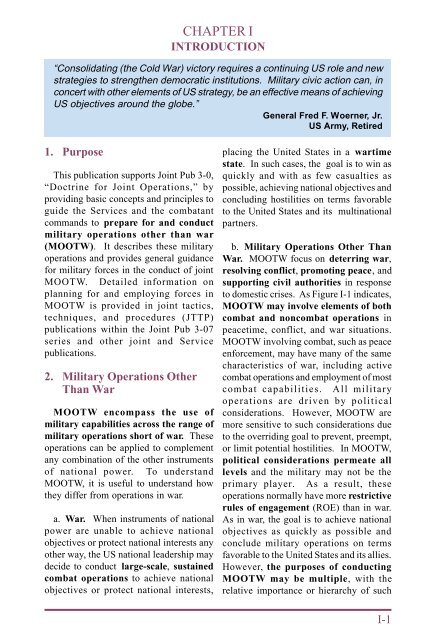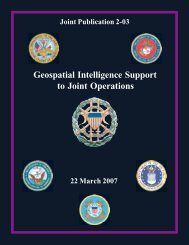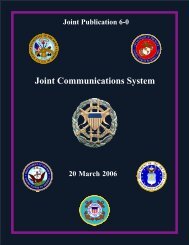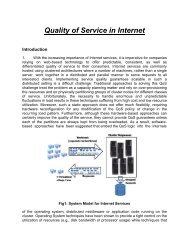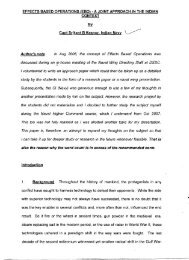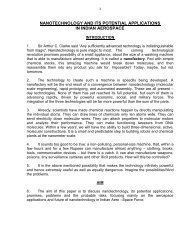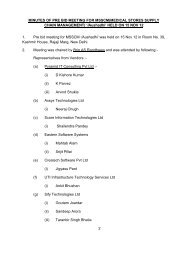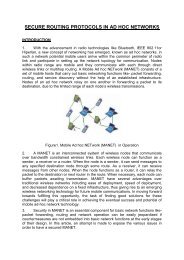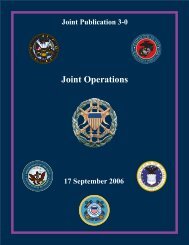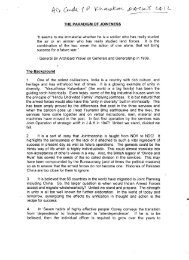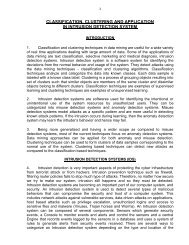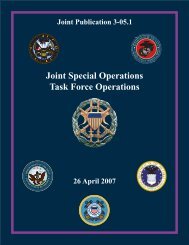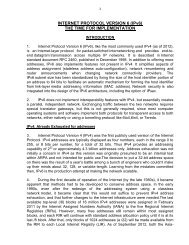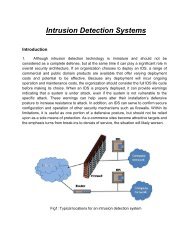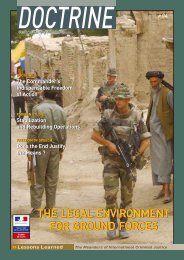JP 3-07 Joint Doctrine For Military Operations Other Than War
JP 3-07 Joint Doctrine For Military Operations Other Than War
JP 3-07 Joint Doctrine For Military Operations Other Than War
- No tags were found...
Create successful ePaper yourself
Turn your PDF publications into a flip-book with our unique Google optimized e-Paper software.
CHAPTER IINTRODUCTION“Consolidating (the Cold <strong>War</strong>) victory requires a continuing US role and newstrategies to strengthen democratic institutions. <strong>Military</strong> civic action can, inconcert with other elements of US strategy, be an effective means of achievingUS objectives around the globe.”General Fred F. Woerner, Jr.US Army, Retired1. PurposeThis publication supports <strong>Joint</strong> Pub 3-0,“<strong>Doctrine</strong> for <strong>Joint</strong> <strong>Operations</strong>,” byproviding basic concepts and principles toguide the Services and the combatantcommands to prepare for and conductmilitary operations other than war(MOOTW). It describes these militaryoperations and provides general guidancefor military forces in the conduct of jointMOOTW. Detailed information onplanning for and employing forces inMOOTW is provided in joint tactics,techniques, and procedures (JTTP)publications within the <strong>Joint</strong> Pub 3-<strong>07</strong>series and other joint and Servicepublications.2. <strong>Military</strong> <strong>Operations</strong> <strong>Other</strong><strong>Than</strong> <strong>War</strong>MOOTW encompass the use ofmilitary capabilities across the range ofmilitary operations short of war. Theseoperations can be applied to complementany combination of the other instrumentsof national power. To understandMOOTW, it is useful to understand howthey differ from operations in war.a. <strong>War</strong>. When instruments of nationalpower are unable to achieve nationalobjectives or protect national interests anyother way, the US national leadership maydecide to conduct large-scale, sustainedcombat operations to achieve nationalobjectives or protect national interests,placing the United States in a wartimestate. In such cases, the goal is to win asquickly and with as few casualties aspossible, achieving national objectives andconcluding hostilities on terms favorableto the United States and its multinationalpartners.b. <strong>Military</strong> <strong>Operations</strong> <strong>Other</strong> <strong>Than</strong><strong>War</strong>. MOOTW focus on deterring war,resolving conflict, promoting peace, andsupporting civil authorities in responseto domestic crises. As Figure I-1 indicates,MOOTW may involve elements of bothcombat and noncombat operations inpeacetime, conflict, and war situations.MOOTW involving combat, such as peaceenforcement, may have many of the samecharacteristics of war, including activecombat operations and employment of mostcombat capabilities. All militaryoperations are driven by politicalconsiderations. However, MOOTW aremore sensitive to such considerations dueto the overriding goal to prevent, preempt,or limit potential hostilities. In MOOTW,political considerations permeate alllevels and the military may not be theprimary player. As a result, theseoperations normally have more restrictiverules of engagement (ROE) than in war.As in war, the goal is to achieve nationalobjectives as quickly as possible andconclude military operations on termsfavorable to the United States and its allies.However, the purposes of conductingMOOTW may be multiple, with therelative importance or hierarchy of suchI-1


